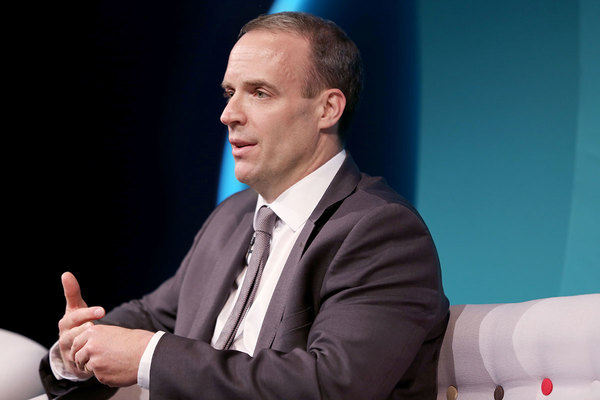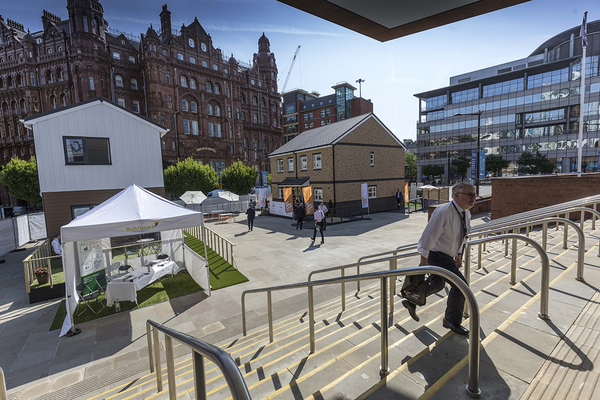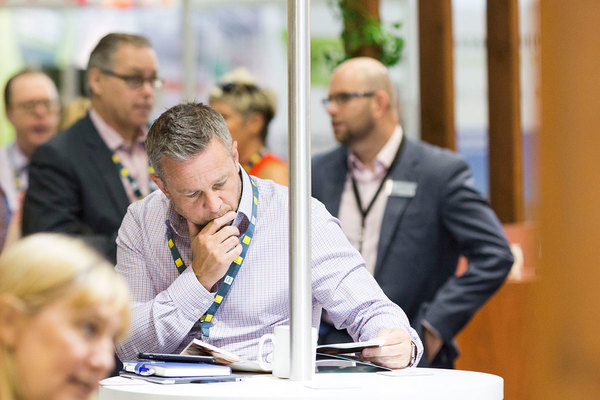You are viewing 1 of your 1 free articles
Dispatches from Housing 2018 – day three
A round-up of the talking points from the third day of Housing 2018 – the Chartered Institute of Housing’s (CIH’s) annual conference and exhibition – in Manchester
Day three of the housing conference in Manchester featured a visit from Dominic Raab, the latest occupant of the housing minister’s chair. Mr Raab, outspoken on Brexit and possessing a back catalogue of colourful quotes on topics ranging from feminism to food banks, can be a controversial figure in a sector where many do not share his views. Nonetheless, or perhaps as a result, the auditorium was packed and there was pin-drop silence as the minister spoke. Mr Raab was followed by Sir Oliver Letwin, then it was back to Manchester Piccadilly and the train home, well in time to catch England’s next step on their route to World Cup glory*.
*a round of 16 defeat is glory of a sort.
Dom jolly
Dominic Raab clearly familiarised himself with the well-worn advice about “always starting with a joke” before making his debut speech to the CIH conference in Manchester today.
But a slightly garbled comparison between the tenure of housing ministers and England football managers may not have been the most appropriate way to segue into a tribute to the survivors of Grenfell.
Nevertheless, there was a good deal of compassion apparent in the minister’s tone when talking about the fire and its aftermath. He admitted the government had not been speedy enough in finding homes for survivors and made the link – apparent to many in the audience for years – between what happened Grenfell and the ‘stigma’ attached to social tenants.
Given which, it struck a bum note with some delegates for the minister to later suggest that fewer immigrants post-Brexit could help the housing sector by driving down prices.
Could it be that stigmatising social tenants is bad but stigmatising immigrants as a cause of the housing crisis is OK? Perhaps we misunderstood…
(Let)Win for housing associations?
Sir Oliver Letwin followed Mr Raab onto the stage, to present the findings of his research into boosting the speed of house building.
There has been some chat around the conference about how housing associations may be the biggest beneficiaries of his recommendations – his view is that the key to faster building on big sites is multi-tenure development. This would surely lead to large housing associations being viewed as the obvious partner for such developments.
Indeed, he said: “Housing associations have an enormous role in the expansion that I’m talking about. We have to open up to a wide range of additional forms of ownership and tenure if we going to solve this problem.”
Sitting next to him and nodding sagely was David Montague, chief executive of L&Q, – a man who’s organisation is finally getting homes out of the ground at Barking Riverside, after years of limited action from a big builder. He clearly likes Sir Oliver’s take.
“Sir Oliver Letwin’s review is a breath of fresh air for our sector, and it is reassuring to hear today that he truly understands the barriers to building faster,” he said.
“Our 10,800 home Barking Riverside development is a prime example of how accelerated delivery can be achieved through securing upfront investment, offering a range of tenures and getting infrastructure including schools and transport in place early.”
The wrongs of Right to Buy
It’s housing’s most divisive subject and the topic of the Right to Buy was again raising heckles at the conference today.
Paul Smith, housing chief at Bristol City Council and a Labour member, gave the controversial policy both barrels. “It’s a complete disaster, it’s one of the worst housing policies ever,” he told delegates in the Exchange Auditorium. “If we need more housing for people to buy, build more houses for them to buy. Don’t sell at a discount the housing they are already in.”
Mr Smith, nicknamed ‘Wolfie’ by blog The Bristolian, claimed Right to Buy is one of the causes of the housing crisis. “Instead of building more houses for those people to buy we sold them the housing they were already in and that’s the foundation of the housing crisis,” he said.
In the blue corner was James Palmer, mayor of Cambridgeshire and Peterborough Combined Authority, who argued Right to Buy is “one of the greatest policies” for housing.
“It’s lifted people out of generational poverty, it gave people the opportunity to aspire to owning their own home and it gave millions of people a chance they would never have had,” he added.
Mr Palmer’s optimism could be sullied a bit by new figures today showing the government has slid further behind its pledge to replace homes sold under Right to Buy.
A problem shared
Bristol’s Mr Smith was in a combative mood and he also used his platform to hit out over shared ownership.
“Shared ownership does nothing to deal with my homelessness problem,” he said. “I’ve got at least 100 people on the streets, 500 people in temporary accommodation. None of those people will benefit from shared ownership so I’m not going to fund it, someone else can fund that, Homes England.”
The councillor did however admit shared ownership can “play a role” but argued it’s “not really a product for those in greatest need”.
James Murray, deputy mayor of Greater London Authority, said shared ownership works in “parts of London” – particularly in part of outer London, where it can help first-time buyers. But he admitted: “It does stretch the definition of genuinely affordable in very central areas [of London] where the headline cost of the home is so high.” In Camden, for example, he said shared ownership was “hard to make work”, whereas in Barking “you can make it work”.
An inclusive future
Mention the need to increase diversity among leadership teams to sector leaders and it is unlikely they will disagree.
Despite this, several delegates felt that a session in the main auditorium on diversity and Inside Housing’s Inclusive Futures campaign was not well-attended as it should have been.
Panellist Steve Douglas cited the turnout for the sessions as evidence that the sector is not focusing sufficiently on tackling the issue. “Many of our current leadership don’t take diversity as seriously as they ought to” said the co-chief executive of Altair, an organisation which recently published a review looking at how to create more diversity among leadership teams.
Emma Maier, editor at Inside Housing, read out some of the shocking examples of discrimination in the sector unearthed by our research published last week. Sasha Deepwell, chief executive of Irwell Valley Housing Association, said there’s a culture of ‘deafening silence’ in the sector on issues of discrimination which needs to change. “People don’t want to speak up, they don’t want to call out their organisation”.
Elly Hoult, chair of CIH Futures, suggested a lack of diversity means young people “don’t think they can make it” and gave examples of older people excluding young people from conversations.
Mr Douglas said as a starting point, organisations need to realise that unconscious bias (where we gravitate to people who are similar to us, when for example, making recruitment decisions) exists.
Perhaps the most inspiring message came from Ms Deepwell though, who told delegates: “You can be the change in the world and in your organisation, it doesn’t matter what level you are.”


